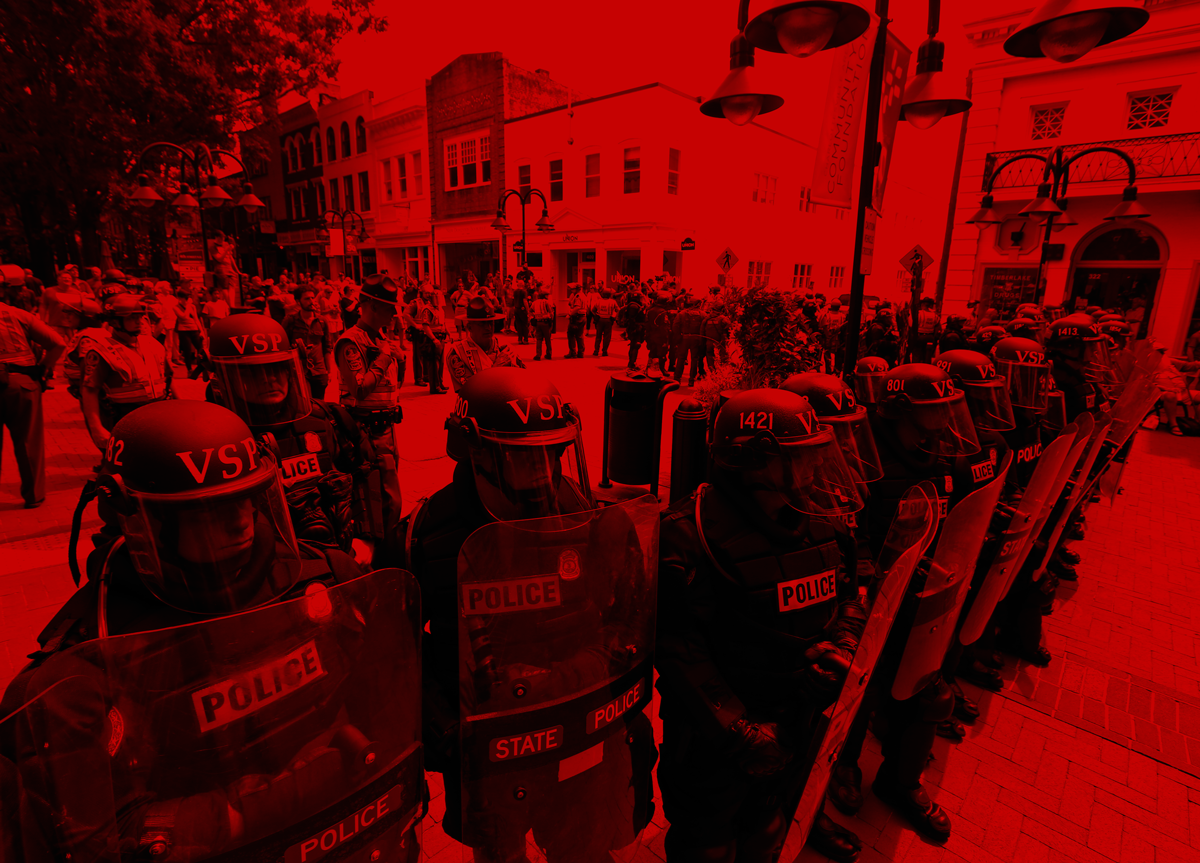Out-of-state militia members would be barred from returning to Virginia if a new lawsuit stemming from the violent white nationalist rally in Charlottesville, Virginia this August succeeds.
“Our complaint shows that there are legal tools available to ensure that the streets do not become battlefields for those who organize and engage in paramilitary activity,” attorney Mary McCord of the Georgetown Law Institute for Constitutional Advocacy and Protection (ICAP) said in a release about the suit. “Virginia law clearly reflects the American tradition that private armies are anathema to a well-organized society.”
The suit seeks to bar both the heavily-armed paramilitary types at the Charlottesville rally — who at the time told ThinkProgress reporters they were there to uphold First Amendment rights and ensure public safety, rather than out of solidarity with neo-Nazis and other ethnonationalist footsoldiers — as well as the neo-Nazi organizers of the August “Unite the Right” rally themselves.
Rally organizers should be regarded as an organized extra-governmental paramilitary, McCord’s team argues in the suit, because they meet legal tests established in past court rulings. The suit describes the organizers as coordinating their dress and tactics, carrying weapons “not ‘as individuals’ exercising their Second Amendment rights to self-defense, but ‘as members of a fighting force,'” and instructing rallygoers to follow “General Orders” written and distributed by prominent white nationalist Eli Mosley. Mosley’s nine-page memo laid out instructions for organizing “our forces” into a “shield wall” which would serve to protect the white nationalists in the park that day along with “the people who are experienced/trained with a firearm.”
On the day of the Charlottesville rally, ThinkProgress reporters witnessed Mosley leading a large cohort of his followers out of the park after police gave a dispersal order — roughly one hour after the surrounding street corners had devolved into open combat between a well-organized block of racists carrying clubs and shields, and a more motley assemblage of Antifa counter-demonstrators throwing projectiles and punches or delivering blows with cudgels of their own. Mosley and other prominent leaders of the rally repeatedly exhibited organized security tactics both at the afternoon rally and the prior night’s torch march, as witnessed by ThinkProgress’ Joshua Eaton.
The suit further describes members of private out-of-state militias, heavily armed with rifles, shotguns, and pistols, as “equipped to inflict massive harm upon a moment’s notice from their commanders.”
“Whatever their stated intentions,” the suit says, nodding to the militia groups’ professed non-partisan presence in Charlottesville, “these groups terrified local residents and caused attendees to mistake them for authorized military personnel. In reality, they answered to no government authority, and their activity draws no support from the Second Amendment.”
The militia members present in Charlottesville in August were visibly better armed than their police counterparts, who were present in far greater numbers but remained largely passive throughout the worst of the violence at the square.
While police did eventually clear the square, they did not drive the sparring factions in separate directions or disperse them from the broader downtown pedestrian mall area nearby, where Heather Heyer was killed and nearly two dozen others were seriously injured by a white nationalist who rammed his car through a crowd of the anti-racist protesters later that day. Her alleged killer, James Fields, had earlier been a member of the shield wall organized under Mosley’s “General Orders,” the plaintiffs say. Gov. Terry McAuliffe (D) later acknowledged that the state police on hand had been outgunned by the militia cluster, a claim police officials disputed citing resources they had on-hand but not fully deployed.
Still, seeking to bar civilians from interstate passage is a sticky constitutional wicket. The complaint bases its appeal for such extraordinary restrictions in multiple overlapping components of Virginia state law — including the rules of state military and militia organization and hierarchy from the state constitution, and a later statute against “paramilitary activity,” defined in part as private organizations using “technique[s] capable of causing injury or death…in, or in furtherance of, a civil disorder.”
The suit names both right-skewing and left-skewing armed militia organizations, including Oathkeeper-style groups, whose memberships often overlap with anti-government fringe thought, and newer groups from the other end of the ideological spectrum like the Socialist Rifle Association.
The actual legal language in the suit makes clear the lawyers hope to obtain a court order prohibiting members of the militia and neo-Nazi groups from behaving in the ways they did in Charlottesville, rather than imposing restrictions on their free movement about the United States. But ICAP described the goals of the suit in blunter language in an email to reporters.
The courts should “prohibit key ‘Unite the Right’ organizers and an array of participating private paramilitary groups and their commanders from coming back to Virginia to conduct illegal paramilitary activity,” the email said.


